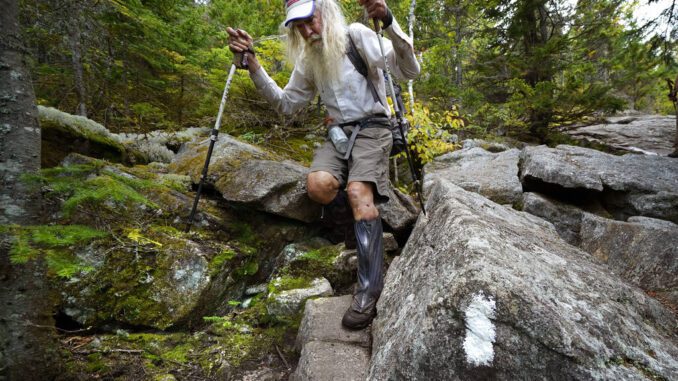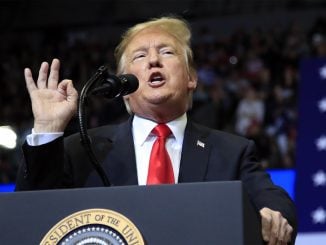
CONCORD, N.H. — As a former ski resort executive, New Hampshire Gov. Chris Sununu knows something about navigating slippery slopes. But recent controversy at a county-owned ski area has raised questions about his grip on the Republican Party heading into the November elections.
Sununu, who is seeking his fourth term, recently inserted himself into a power struggle over Gunstock Mountain Resort, siding with staff who quit en masse and forced a two-week shutdown last month. Pushing back against anti-government activists who want to privatize the ski area, Sununu also called for the ouster this fall of three Republican legislators with an oversight role of the resort.
“These individuals have made bad decisions, and until they are removed from their positions and replaced with good people who recognize the wonderful asset that Gunstock is, the county will continue to suffer,” he wrote in an open letter to area residents.
Sununu’s intervention was seen by many as a rebuke of the Free State Project, a 20-year-old political experiment that promotes a mass migration of 20,000 libertarians to New Hampshire. Fewer than 6,500 have arrived so far, but they have made inroads everywhere from school boards to the legislature. What that means for Sununu, the Republican Party and the state overall is uncertain. But so-called Free Staters are clearly shaking things up.
Conceived by a Yale graduate student in 2001, the Free State Project picked New Hampshire — with its low taxes, easy entry into politics and “Live Free or Die” motto — as its destination two years later. By 2016, 20,000 people had promised to pack their bags within five years. That hasn’t happened, and the group’s past president now says the pledge model has fallen by the wayside.
But it hasn’t taken huge numbers to get results.
About 45 Free Staters have been elected to the legislature since 2008; more than 20 serve now. While that is a small fraction of the 424-member legislature, it’s enough to influence policy given the GOP’s slim majority in the House.
The group counts the House majority leader as one of its own, and members often team up with dozens of other lawmakers who make up the wider “freedom caucus,” securing victories on legislation related to school choice, vaccines and limiting the governor’s power during emergencies.
One Free State stronghold is Belknap County, which owns the Gunstock ski area. After months of tension, top managers abruptly resigned last month, then returned after two commissioners were ousted. Sununu’s letter targeted both the commission members and three of the Republican lawmakers who appointed them, saying they had lost the public’s trust.
The governor later described their handling of the ski area as “just the latest episode of their craziness,” noting that one of the three — Rep. Michael Sylvia — supports having New Hampshire secede from the United States. But Sununu said he doesn’t consider them representatives of either the Free State movement or the Republican Party.
“I don’t have any problem with Free Staters,” he said. “These are not Free Staters.”
Sununu’s involvement in the Gunstock dispute could signal a turning point, said political consultant Scott Spradling.
“There was, I think, a fine line between Republicans and Free Staters. Now there’s a battle line,” he said. “Gunstock could very well be a high watermark, putting warning lights around the Free State movement for New Hampshire voters who are now going to associate their identity with this controversy.”
Either side could make the other’s lives politically miserable, Spradling said. But Sununu has credibility and popularity on his side.
“Long term, I would put my money on the establishment right, on the Sununu side of the aisle, because his politics appeals to a far broader audience,” Spradling said.
Sununu, who surprised political watchers by seeking reelection instead of running for U.S. Senate, faces five largely unknown opponents in the Sept. 13 primary, and polls show him with a wide lead over the Democratic candidate, state Sen. Tom Sherman. Even Rep. Norm Silber, one of the lawmakers Sununu wants ousted, expects Sununu to be reelected and will vote for him again if he is the nominee. But he contends that it’s Sununu who has strayed from the GOP.
“Running as a Republican with a long family history of supporting the Republican Party, I thought for sure that he would be a real Republican,” Silber said. “And he has, in my view, pandered to non-Republicans in an effort to build a base of support.”
Silber said he is not a Free Stater, but he’s being called one by Democrats hoping to flip seats in November by painting all Republicans with a Free State brush. The ski area controversy has spurred the creation of a political action committee to back candidates from both parties to defeat the “extremist Free State agenda” in Belknap County.
“People on the left, or people who don’t like fiscally conservative Republicans, have a tendency to refer to people they don’t like as Free Staters,” he said.
Carla Gericke, past president of the Free State Project, agreed.
“When there’s something positive, people laud that, but on the flip side, we’ve also become the boogeyman whenever it’s convenient,” she said. “We’re at the stage where we are successful enough that we’re just being used as a pawn between the two parties. And we just do our own thing.”



